| Listing 1 - 10 of 16 | << page >> |
Sort by
|
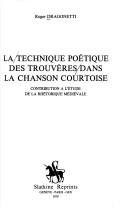
ISBN: 2051000018 Year: 1979 Volume: 2 Publisher: Genève Slatkine reprints
Abstract | Keywords | Export | Availability | Bookmark
 Loading...
Loading...Choose an application
- Reference Manager
- EndNote
- RefWorks (Direct export to RefWorks)
Poetry --- French literature (outside France) --- Old French literature --- Literary rhetorics --- retoriek --- Chansons de trouvères --- Medieval rhetoric --- Middeleeuwse retorica --- Retorica [Middeleeuwse ] --- Rhetoric [Medieval ] --- Rhétorique médiévale --- Trouvère songs --- Trouvère-liederen --- Trouvères --- Trouvères--Chansons --- French poetry --- To 1500 --- History and criticism
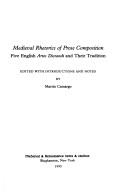
ISBN: 0866981683 Year: 1995 Volume: 115 Publisher: Binghamton ; New York Medieval & Renaissance Texts & Studies
Abstract | Keywords | Export | Availability | Bookmark
 Loading...
Loading...Choose an application
- Reference Manager
- EndNote
- RefWorks (Direct export to RefWorks)
Medieval rhetoric --- Middeleeuwse retorica --- Retorica [Middeleeuwse ] --- Rhetoric [Medieval ] --- Rhétorique médiévale --- 82-5 --- 82.085 --- 091:82-5 --- Rhetoric, Medieval --- Redevoering. Preek --- Retorica. Argumentatieleer. Voordrachtkunst --- Handschriftenkunde. Handschriftencatalogi-:-Redevoering. Preek --- 091:82-5 Handschriftenkunde. Handschriftencatalogi-:-Redevoering. Preek --- 82.085 Retorica. Argumentatieleer. Voordrachtkunst --- 82-5 Redevoering. Preek --- 82-5 Oratory. Speeches. Sermons. Addresses. Lectures. Others --- Oratory. Speeches. Sermons. Addresses. Lectures. Others
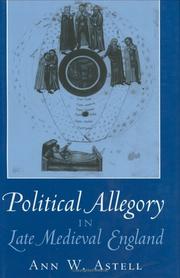
ISBN: 0801435609 0801474655 Year: 1999 Publisher: Ithaca : Cornell University Press,
Abstract | Keywords | Export | Availability | Bookmark
 Loading...
Loading...Choose an application
- Reference Manager
- EndNote
- RefWorks (Direct export to RefWorks)
Ann W. Astell here affords a radically new understanding of the rhetorical nature of allegorical poetry in the late Middle Ages. She shows that major English writers of that era-among them, William Langland, John Gower, Geoffrey Chaucer, and the Gawain-poet-offered in their works of fiction timely commentary on current events and public issues. Poems previously regarded as only vaguely political in their subject matter are seen by Astell to be highly detailed and specific in their veiled historical references, implied audiences, and admonitions. Astell begins by describing the Augustinian and Boethian rhetorical principles involved in the invention of allegory. She then compares literary and historical treatments of key events in fourteenth- and fifteenth-century England, finding an astonishing match of allusions and code words, especially those deriving from puns, titles, heraldic devices, and personal cognizances, as well as repeated proverbs, prophecies, and exempla. Among the works she discusses are John Ball's Letters and parts of Piers Plowman, which she presents as two examples of allegorical literature associated with the Peasants' Revolution of 1381; Gower's allegorical representation of the Merciless Parliament of 1388 in Confessio Amantis; and Chaucer's brilliant literary handling of key events in the reign of Richard II. In addition Astell argues for a precise dating of Sir Gawain and the Green Knight between 1397 and 1399 and decodes the work as a political allegory.
Allegorie --- Allegory --- Allégorie --- Inventio (Retorica) --- Invention (Rhetoric) --- Invention (Rhétorique) --- Medieval rhetoric --- Middeleeuwse retorica --- Retorica [Middeleeuwse ] --- Rhetoric [Medieval ] --- Rhétorique médiévale --- English literature --- Political poetry, English (Middle) --- Politics and literature --- Rhetoric, Medieval. --- Allegory. --- Personification in literature --- Symbolism in literature --- Rhetoric --- English political poetry, Middle --- Middle English political poetry --- Political poetry, English --- Political poetry, Middle English --- English poetry --- History and criticism. --- History --- Great Britain --- Politics and government --- Rhetoric, Medieval --- History and criticism --- Middle English, 1100-1500 --- Political poetry [English ] (Middle) --- To 1500 --- 1154-1399 --- 1399-1485
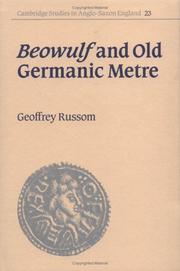
ISBN: 0511582986 0511002793 9780511002793 0521093090 0521593409 Year: 1998 Volume: 23 Publisher: Cambridge New York Cambridge University Press
Abstract | Keywords | Export | Availability | Bookmark
 Loading...
Loading...Choose an application
- Reference Manager
- EndNote
- RefWorks (Direct export to RefWorks)
This 1998 book is a clear and accessible account of early Germanic alliterative verse which explains how such verse was treated by the Beowulf poet. There are differences of poetic style between Beowulf and the otherwise similar verse of ancient Scandinavia and continental Europe. Such distinctions have intrigued scholars for over a century, but Russom is the first to provide a systematic explanation of Old English, Old Norse, Old Saxon, and Old High German alliterative metres. The system of alliterative rules described by Russom derives from ordinary language; the rules change with language over historical time, rather than persisting as arbitrary restrictions. Once the relations between language and metre are identified, it is possible to see how language change yielded the divergent metrical practices which gave each tradition its special character. Russom's results should interest scholars of Old English and related Germanic languages, as well as linguists and those concerned with poetic metre.
English language --- Germanic languages --- Civilization, Anglo-Saxon. --- Rhetoric, Medieval. --- Alliteration. --- Rhyme --- Versification --- Anglo-Saxon civilization --- Anglo-Saxons --- Teutonic languages --- Indo-European languages --- Versification. --- Rhythm. --- Civilization --- Beowulf --- Bjowulf --- Arts and Humanities --- Literature --- Civilization [Anglo-Saxon ] --- Rhetoric [Medieval ] --- Alliteration --- Beowulf - Versification. --- English language - Old English, ca. 450-1100 - Rhythm. --- Germanic languages - Versification. --- BEOWULF --- ENGLISH LANGUAGE --- ANGLO-SAXON CIVILIZATION --- MEDIEVAL RHETORIC --- ALLITERATION --- ALTHOCHDEUTSCHE LITERATUR --- VERSIFICATION --- OLD ENGLISH --- HILDEBRANDSLIED --- RHYTHM
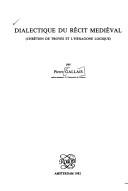
ISBN: 9062037445 9789062037445 Year: 1982 Volume: 9 Publisher: Amsterdam Rodopi
Abstract | Keywords | Export | Availability | Bookmark
 Loading...
Loading...Choose an application
- Reference Manager
- EndNote
- RefWorks (Direct export to RefWorks)
Fiction --- Old French literature --- Christian of Troyes --- Chevaliers et chevalerie dans la littérature --- Knights and knighthood in literature --- Logic [Medieval ] --- Logica [Middeleeuwse ] --- Logique médiévale --- Medieval logic --- Medieval rhetoric --- Middeleeuwse logica --- Middeleeuwse retorica --- Retorica [Middeleeuwse ] --- Rhetoric [Medieval ] --- Rhétorique médiévale --- Ridders en ridderschap in de literatuur --- Chretien --- Technique --- Chrétien de Troyes --- Technique. --- Arthurian romances --- Knights and knighthood in literature. --- Logic, Medieval. --- Narration (Rhetoric) --- Rhetoric, Medieval. --- History and criticism. --- History --- Chrestien de Troyes --- Christian von Troyes --- Logic, Medieval --- Rhetoric, Medieval --- History and criticism --- Chrétien, --- Chrestien de Troyes, --- Chrestien, --- Kretʹen, --- Kretjen, --- Kristian, --- Troyes, Chrétien de, --- Кретјен, --- To 500 --- Rhetoric --- Discourse analysis, Narrative --- Narratees (Rhetoric) --- Chretien - Technique
Book
ISBN: 2503360580 9782503360584 Year: 1995 Volume: 58 Publisher: Turnhout : Louvain-la-Neuve : Brepols, Publications de l'Institut d'études médiévales / Université catholique de Louvain,
Abstract | Keywords | Export | Availability | Bookmark
 Loading...
Loading...Choose an application
- Reference Manager
- EndNote
- RefWorks (Direct export to RefWorks)
Ancient rhetoric --- Antieke retoriek --- Medieval rhetoric --- Middeleeuwse retorica --- Retorica [Middeleeuwse ] --- Retoriek [Antieke ] --- Retoriek van de Oudheid --- Rhetoric [Ancient ] --- Rhetoric [Medieval ] --- Rhétorique ancienne --- Rhétorique de l'Antiquité --- Rhétorique médiévale --- Rhetoric, Medieval --- Moyen âge, --- Sources --- --Méthodologie --- --Rhétorique --- --Rhetoric, Medieval --- 871 CICERO, MARCUS TULLIUS --- 87.085 --- 808.00902 --- Latijnse literatuur--CICERO, MARCUS TULLIUS --- Klassieke literatuur: retorica --- Literature Rhetoric and Collections 500-1499 --- Rhetoric, Medieval. --- 87.085 Klassieke literatuur: retorica --- 871 CICERO, MARCUS TULLIUS Latijnse literatuur--CICERO, MARCUS TULLIUS --- Rhétorique médiévale --- Cicero, Marcus Tullius --- Rhetorica ad Herennium --- Influence --- Moyen âge, 476-1492 --- Méthodologie --- Rhétorique --- Ciceron (106-43 av. j-c.) --- Rhetorique
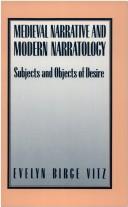
ISBN: 0814787665 0814787614 Year: 1989 Publisher: New York, NY : New York University Press,
Abstract | Keywords | Export | Availability | Bookmark
 Loading...
Loading...Choose an application
- Reference Manager
- EndNote
- RefWorks (Direct export to RefWorks)
Autobiography. --- Desire in literature. --- French literature --- Narration (Rhetoric) --- Rhetoric, Medieval. --- Self in literature. --- History and criticism. --- History --- Begeerte in de literatuur --- Desire in literature --- Désir dans la littérature --- Ik in de literatuur --- Medieval rhetoric --- Middeleeuwse retorica --- Moi dans la littérature --- Retorica [Middeleeuwse ] --- Rhetoric [Medieval ] --- Rhétorique médiévale --- Autobiographies --- Egodocuments --- Memoirs --- 82-3 --- Autobiography --- -Narration (Rhetoric) --- Rhetoric, Medieval --- Self in literature --- Narrative (Rhetoric) --- Narrative writing --- 82-3 Proza. Fictie. Narratologie --- Proza. Fictie. Narratologie --- History and criticism --- Technique --- Biography as a literary form --- Fiction --- Old French literature --- To 1500 --- 82-3 Fiction. Prose narrative --- Fiction. Prose narrative --- Rhetoric --- Discourse analysis, Narrative --- Narratees (Rhetoric)
Book
ISBN: 9782503549019 2503549012 Year: 2013 Volume: 7 Publisher: Turnhout Brepols
Abstract | Keywords | Export | Availability | Bookmark
 Loading...
Loading...Choose an application
- Reference Manager
- EndNote
- RefWorks (Direct export to RefWorks)
Cassiodorus, Flavius Magnus Aurelius --- Ancient rhetoric --- Antieke retoriek --- Medieval rhetoric --- Middeleeuwse retorica --- Retorica [Middeleeuwse ] --- Retoriek [Antieke ] --- Retoriek van de Oudheid --- Rhetoric [Ancient ] --- Rhetoric [Medieval ] --- Rhétorique ancienne --- Rhétorique de l'Antiquité --- Rhétorique médiévale --- Rhetoric, Ancient. --- Rhetoric, Medieval. --- Latin language --- Latin language, Medieval and modern --- Latin (Langue) --- Latin médiéval et moderne (Langue) --- Style. --- Stylistique --- Style --- Cassiodorus, --- Literary style. --- Bible --- Criticism, interpretation, etc. --- History --- 276 =71 CASSIODORUS --- Classical languages --- Greek language --- Greek rhetoric --- Latin rhetoric --- Latijnse patrologie--CASSIODORUS --- Rhetoric --- Rhétorique ancienne --- Rhétorique médiévale --- Latin médiéval et moderne (Langue) --- Cassiodorus --- Style [Literary ] --- Criticism, interpretation, etc --- Middle Ages, 600-1500 --- Latin language [Medieval and modern ] --- Middle Ages, 500-1500 --- Rhetoric, Ancient --- Rhetoric, Medieval

ISBN: 2852038226 9782852038226 Year: 1998 Volume: 45 Publisher: Paris : Editions Honoré Champion,
Abstract | Keywords | Export | Availability | Bookmark
 Loading...
Loading...Choose an application
- Reference Manager
- EndNote
- RefWorks (Direct export to RefWorks)
Old French literature --- Christian church history --- Fiction --- Medieval Latin literature --- anno 1100-1199 --- anno 1200-1299 --- United Kingdom --- Medieval rhetoric --- Middeleeuwse retorica --- Retorica [Middeleeuwse ] --- Rhetoric [Medieval ] --- Rhétorique médiévale --- Christian poetry, Anglo-Norman --- Anglo-Norman literature --- Christian hagiography --- Christian saints in literature. --- Poésie chrétienne anglo-normande --- Littérature anglo-normande --- Hagiographie chrétienne --- Saints chrétiens dans la littérature --- History and criticism --- History and criticism. --- History --- Histoire et critique --- Histoire --- Christian saints in literature --- -Christian poetry, Anglo-Norman --- -Christian saints in literature --- -Hagiography, Christian --- Hagiography --- Anglo-Norman Christian poetry --- Anglo-Norman poetry --- British literature --- French literature --- -History and criticism --- -Anglo-Norman literature --- Poésie chrétienne anglo-normande --- Littérature anglo-normande --- Hagiographie chrétienne --- Saints chrétiens dans la littérature --- Hagiographie --- Littérature médiévale --- Christian poetry, Anglo-Norman - History and criticism --- Anglo-Norman literature - History and criticism --- Christian hagiography - History - To 1500 --- HAGIOGRAPHIE MEDIEVALE --- ANGLETERRE
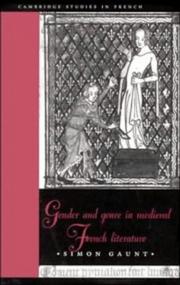
ISBN: 0521464943 0521022606 0511519508 9780521022606 9780511519505 9780521464949 Year: 1995 Volume: 53 Publisher: Cambridge Cambridge University Press
Abstract | Keywords | Export | Availability | Bookmark
 Loading...
Loading...Choose an application
- Reference Manager
- EndNote
- RefWorks (Direct export to RefWorks)
This wide-ranging study explores the ideological framework of genre in Old French and Occitan literature by charting the relationship between ideology and gender in five key genres: the chansons de geste, courtly romance, the Occitan canso, hagiography, and the fabliaux. Simon Gaunt offers new readings of canonical Old French and medieval Occitan texts such as the Chanson de Roland, Chrétien de Troyes's Chevalier de la charrette, and lyrics by Bernart de Ventadorn, and in addition he considers many less well-known works and less familiar genres such as hagiography and the fabliaux. Drawing on contemporary feminist theory, he examines how masculinity, as well as femininity, is constructed in medieval French and Occitan texts, and shows that gender is a crucial element in the formation of the ideologies that underpin medieval literary genres.
Genres [Letterkundige ] --- Genres [Literaire ] --- Genres littéraires --- Hommes et femmes [Relations entre ] dans la littérature --- Letterkundige genres --- Literaire genres --- Literary form --- Man-vrouw relaties in de literatuur --- Man-woman relationships in literature --- Medieval rhetoric --- Middeleeuwse retorica --- Relations entre hommes et femmes dans la littérature --- Retorica [Middeleeuwse ] --- Rhetoric [Medieval ] --- Rhétorique médiévale --- Rôle selon le sexe dans la littérature --- Sekse (Psychologie) in de literatuur --- Seksuele rolpatronen in de literatuur --- Sex (Psychology) in literature --- Sex role in literature --- Sexe (Psychologie) dans la littérature --- Feminism and literature --- French literature --- Man-woman relationships in literature. --- Provençal literature --- Rhetoric, Medieval. --- Sex (Psychology) in literature. --- Sex role in literature. --- History. --- History and criticism --- Theory, etc. --- History --- Rhetoric, Medieval --- Literature --- History and criticism&delete& --- Theory, etc --- Women authors --- To 1500 --- Provençal literature --- France --- French literature - To 1500 - History and criticism - Theory, etc. --- Provenðcal literature - History and criticism - Theory, etc. --- Feminism and literature - France - History. --- Arts and Humanities --- Literary form. --- Literature and feminism
| Listing 1 - 10 of 16 | << page >> |
Sort by
|

 Search
Search Feedback
Feedback About UniCat
About UniCat  Help
Help News
News